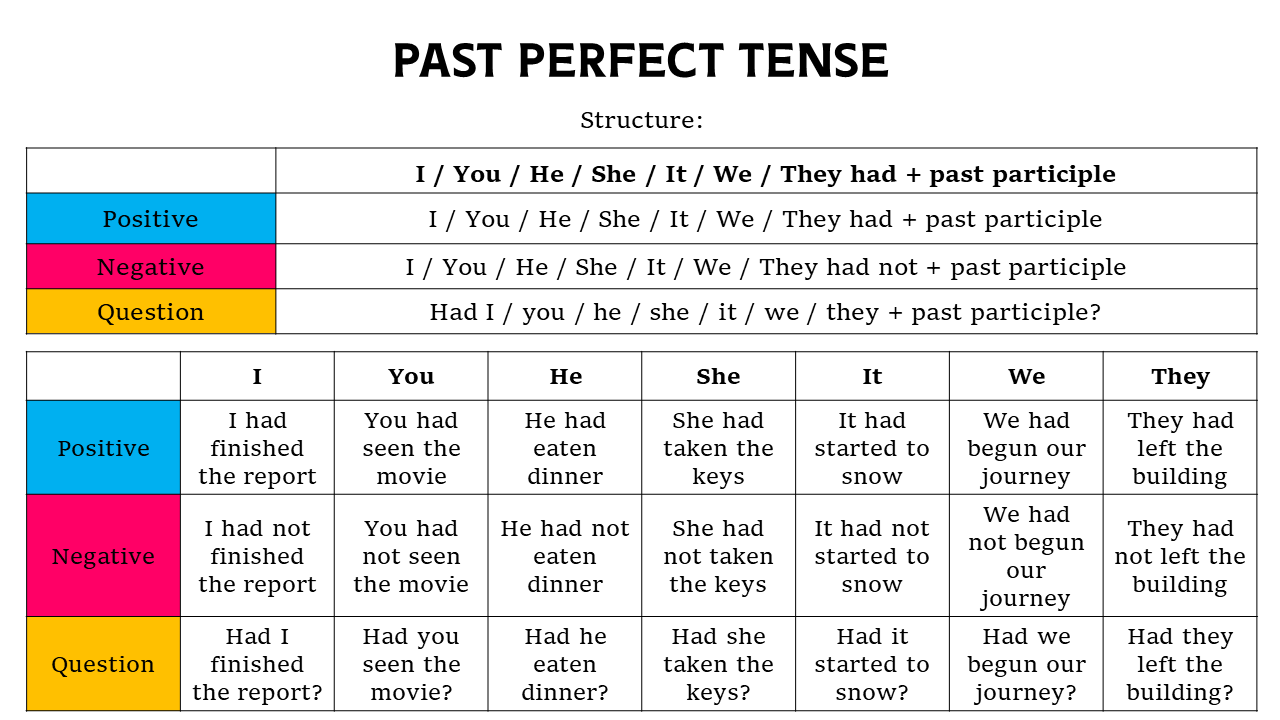In the tapestry of English tenses, the past perfect tense is akin to a subtle shade that adds depth and clarity to our narratives, especially when discussing events in the past. It’s a crucial tense for establishing a sequence of events, allowing us to specify which action happened first in a timeline that’s already behind us.
Definition
The past perfect tense is used to describe an action that was completed before another action or time in the past. It’s the tense of hindsight, offering a window into events that were finished before other past events began, adding layers to our storytelling and written communication.
Formula/Structure
The past perfect tense is constructed with the auxiliary verb “had” followed by the past participle of the main verb. This structure remains consistent regardless of the subject. Here’s how it looks:
- Affirmative: Subject + had + past participle
- Example: “I had finished my homework before dinner.”
- Negative: Subject + had not + past participle
- Example: “They had not left when the movie started.”
- Interrogative: Had + subject + past participle?
- Example: “Had you seen the movie before last night?”
Rules with Examples
- Regular verbs form their past participle with an -ed ending: “We had stopped at the red light.”
- Irregular verbs have unique past participle forms: “She had gone home early.”
- The past perfect is often used with time expressions such as “before,” “by the time,” “by,” “when,” and “until”: “He had already eaten by the time I arrived.”
How to Make Past Perfect Tense?
1. Positive Past Perfect Tense
Express actions completed before a specific moment or another action in the past.
2. Negative Past Perfect Tense
Indicate that an action had not been completed before a certain past moment or another action.
3. Interrogative Past Perfect Tense
Form questions about whether an action had been completed before another past event.
Examples of Past Perfect Tense
Examples of Positive Past Perfect Tense
- “By the time the party started, I had already left.”
- “She had finished her assignment before going out.”
- “We had met before, hadn’t we?”
- “He had saved enough money to buy a car.”
- “They had seen the movie, so they didn’t want to go again.”
- “The train had departed by the time we reached the station.”
- “I had completed the project by the deadline.”
- “She had learned three languages by the age of twelve.”
- “We had walked all the way home before it started raining.”
- “He had made dinner by the time she got home.”
Examples of Negative Past Perfect Tense
- “I hadn’t heard the news until you told me.”
- “She hadn’t visited Paris before that trip.”
- “We hadn’t decided on a name before the baby was born.”
- “He hadn’t seen such a beautiful sunset before.”
- “They hadn’t eaten sushi before that night.”
- “The movie hadn’t started when we arrived at the cinema.”
- “I hadn’t met his family before the wedding.”
- “She hadn’t realized the importance of the meeting.”
- “We hadn’t thought about the consequences.”
- “He hadn’t fixed the leak before it caused damage.”
Examples of Interrogative Past Perfect Tense
- “Had you ever traveled abroad before that trip?”
- “Had she finished her work when you called?”
- “Had we met before the conference?”
- “Had he known about the surprise party?”
- “Had they lived in the city before moving to the countryside?”
- “Had the movie started when you got to the theater?”
- “Had you eaten at that restaurant before?”
- “Had she seen the error in the report?”
- “Had we agreed on a plan before proceeding?”
- “Had he taken the medication as prescribed?”

Exercise of Past Perfect Tense With Answers
Questions
- I (to complete) the report before he asked for it.
- She (not to see) the Eiffel Tower before that trip.
- (they to leave) the party before we arrived?
- He (to finish) his meal before everyone else.
- We (not to decide) on the color before the sale ended.
- (you to hear) about the incident before today?
- The flowers (to wilt) before the wedding day.
- She (not to realize) the mistake until it was too late.
- (he to sell) his car before buying the new one?
- They (to watch) the entire series before the finale aired.
Answers
- I had completed the report before he asked for it.
- She hadn’t seen the Eiffel Tower before that trip.
- Had they left the party before we arrived?
- He had finished his meal before everyone else.
- We hadn’t decided on the color before the sale ended.
- Had you heard about the incident before today?
- The flowers had wilted before the wedding day.
- She hadn’t realized the mistake until it was too late.
- Had he sold his car before buying the new one?
- They had watched the entire series before the finale aired.
The past perfect tense offers a nuanced way to discuss the past, giving us the ability to narrate our stories with more depth and precision. By mastering this tense, you can enhance your storytelling, making your narratives richer and more engaging.


